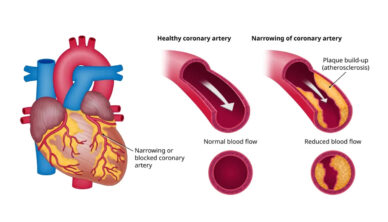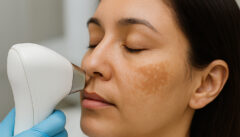Contents
Coronary Artery Disease

Coronary artery disease (CAD) is the most common type of heart disease and a leading cause of heart attacks.
What is Coronary Artery Disease (CAD)?
Coronary artery disease develops when the arteries supplying blood to the heart become hardened and narrowed due to plaque buildup (atherosclerosis). This reduces oxygen supply to the heart, leading to chest pain (angina) and increasing the risk of a heart attack.
Signs & Symptoms
CAD can develop over many years, often without noticeable symptoms until the blood flow is severely restricted. Some common symptoms include:
- Chest Pain or Discomfort (Angina) – Pressure, tightness, or burning in the chest
- Shortness of Breath – Difficulty breathing, even during mild activity
- Fatigue – Feeling unusually tired, especially with exertion
- Pain in the Arms, Neck, Jaw, or Back – Discomfort spreading from the chest
- Heart Palpitations – Irregular or rapid heartbeat
- Dizziness or Nausea – Feeling lightheaded, weak, or sick
In severe cases, CAD can lead to a heart attack. If you experience chest pain, shortness of breath, or sudden dizziness, seek emergency medical attention immediately.
Potential Causes & Risk Factors
CAD is caused by a buildup of fatty deposits (plaque) in the arteries. Several factors increase the risk of developing CAD, which include;
- High Blood Pressure (Hypertension) – Increases artery strain
- High Cholesterol Levels – Leads to plaque buildup
- Smoking – Damages artery walls and reduces oxygen supply
- Diabetes – Raises the risk of atherosclerosis
- Obesity – Contributes to high blood pressure and diabetes
- Lack of Exercise – Weakens heart and vascular health
- Unhealthy Diet – High in saturated fats and processed foods
- Chronic Stress – Can raise blood pressure and cholesterol
- Family History of Heart Disease – Genetic predisposition increases risk
Diagnosis
At Royal Buckinghamshire Hospital, we offer advanced diagnostic tests to detect and assess CAD, including:
- Electrocardiogram (ECG) – Measures heart electrical activity
- Echocardiogram – Uses ultrasound to assess heart function
- Exercise Stress Test – Evaluates heart performance during physical activity
- CT Coronary Angiography – Non-invasive imaging of coronary arteries
- Cardiac Catheterization (Angiogram) – Provides detailed images of blockages
Early diagnosis of CAD is essential to prevent heart attacks and serious complications.
Treatment Options
Treatment for CAD focuses on improving heart function, restoring blood flow, and reducing risk factors. Available options include:
Lifestyle Changes
- Heart-Healthy Diet – Low in saturated fats, salt, and processed foods
- Regular Exercise – Helps improve heart function and circulation
- Smoking Cessation – Reduces further artery damage
- Weight Management – Lowers blood pressure and cholesterol
Medications
- Blood Thinners (Aspirin, Clopidogrel) – Reduces clot formation
- Cholesterol-Lowering Drugs (Statins) – Prevents plaque buildup
- Beta-Blockers & ACE Inhibitors – Helps manage blood pressure and heart function
- Nitrates – Improves blood flow and reduces chest pain
Medical Procedures & Surgery
- Coronary Angioplasty & Stenting – Opens narrowed arteries using a small balloon and stent
- Coronary Artery Bypass Grafting (CABG) – Creates a new path for blood flow using a blood vessel graft
- Enhanced External Counterpulsation (EECP) – Non-invasive therapy to improve circulation
Our expert cardiologists will create a personalized treatment plan tailored to your condition and risk factors.
Monitoring and Follow-Up Care
Managing coronary artery disease requires regular check-ups and ongoing care. At The Royal Buckinghamshire Hospital, we can provide:
- Routine Cardiac Assessments – Regular monitoring of heart health
- Medication Management – Adjustments to optimize treatment
- Cardiac Rehabilitation Programs – Guided exercise and lifestyle support
- Preventive Screenings – Identifying risks before complications arise
Our goal is to help you live a heart-healthy life while reducing the risk of heart attacks and complications.
Arranging To Visit A Private GP

At Royal Buckinghamshire Hospital, we provide fast diagnosis, expert treatment, and ongoing care to support recovery and reduce future risk. Make an appointment with one of our private GPs who can refer you to our specialist cardiologist. Appointments are available to everyone and can often be booked for the same day. There is no need to be registered with our The Royal Buckinghamshire Hospital, or live locally.
If you have insurance which covers a GP visit, we can in most cases invoice the insurer directly. Where you are paying directly, the cost for a 30 minute consultation is £100.
Any additional costs will always be discussed. They could apply if you are referred for an MRI scan, or to a consultant, or for other agreed decisions to support your health.
Our Resident Private GP
Dr Chamali is welcoming and highly experienced. He offers his patients sound diagnosis and treatment, along with individual care focused on their future health.
25 March 2025




